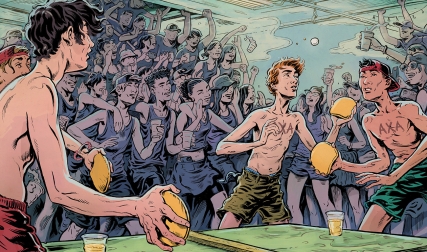In 1992, my slice of Dartmouth was defined by a deeply divided two-party system. Maybe it was the hype of the presidential election or the imperative of choosing the best electives, but I was convinced I needed to define myself as part of an Us versus Them. Freshman me thought he needed to choose between the advocates of high-flying Lob pong—aka the Loberals—or the adherents to fast-serve Slam pong—aka the Servatives.
It didn’t even occur to me that I didn’t have to make such a choice. When I first set foot on campus, it was hard not to fall in as an acolyte of the high-profile Greek system whose alums had served up National Slampoon’s Animal House and Green Eggs and Slam. I saw Dartmouth in a very specific light, partially shed by a high school history teacher who’d proclaimed my school of choice to be elitist. I took this observation as advice rather than a warning, followed the most obvious logic, and signed on with the traditionalist Slam Servatives. I eschewed Loberalism in an effort to reflect what I believed to be true Dartmouthiness.
I took to slam like a fish to water, possibly drinking a live goldfish along the way. The Grand Old Pong tribe had me thinking that Servatives raged to maintain the status quo. They sang drunken praise of Slamiel Webster and his idol Alexander Slamilton. I think I even had next after Laura Ingslam and Dinesh D’Server at one point. The pong I played bred exclusion, discouraged curious participation, and didn’t apologize for its excesses. The fast serves and forceful swatting threatened bystanders and sprayed the pristine basement environment with sloshed beer and broken cups. The two-by-four net was our border wall. Traditional slam-ily values defined a team as a union of one server and one slammer—anything other than that was an unnatural pong abomination. What next—playing pong with your dog?
I was ensconced in the Servative camp, and my life’s path looked set to proceed as such. A banking job at Morgan Slamly, a private equity gig in Slam Francisco, and presumed retirement near Mar-a-Lager. As a Servative, I was not just willing to bleed for Uncle Slam, but I was fervently disdainful of the Loberal elites elsewhere on campus. Out of touch lob snobs backed by powerful lob-byists! Social pong? Sounds like socialism. They’re probably in cahoots with those lame Beirut tossers.
When my mindset changed, it wasn’t because I’d been deprogrammed or forced to watch loberal pongdits such as Jake “the Keg” Tapper. At some point, I came to see the world through different beer goggles. The loberals in my life—roommates, teammates, lifemate—hadn’t spent every night of their formative years in a swampy basement bubble acting out a version of life that I had believed to be slam-ifest destiny. They saw my allegiance to slam as perhaps misguided, maybe even recognized it as an imaginary identity. Those loberals must have suspected latent sympathies, which they nurtured with patience, tolerance and love. Though some of them were terrible pong players (like, embarrassingly bad), their lob pong ethos was powerful and I loosened my grip on the paddle handle I’d been white-knuckling for so many years. These days, when given the choice, I choose lob.
Bless lob pong. It’s simple to learn and it can be played by anyone. It’s a public option to a lifetime of healthy recreation. Lob is less destructive to the environment. Loberals don’t deny climate change; C’s are in fact rising via grade inflation. Yes, a game of lob can be taxing, but it offers guaranteed social pong security, freedom to choose your playing partner, and the equality of alternating turns and shared chugging. Of the two games, let’s face it, lob is more fun. The volleys arc, rainbow-like, over the table in a breathless display of sinks and saves. A leading voice in the Loberal camp said it best: “When they serve low, we serve high.” I’ve since revisited my alma basement, and I see that it is rightly tolerant of both slam and lob. It isn’t a paddleground, divided by pong preference. Nor is it a bastion of never-lobbers and slampathizers. It’s a room where Servatives might hold sway for a term (or 12), but there will always be a time for the people’s pong, even on Wednesdays. Kegs are out (the casualty of can-full culture), but slam is no longer a hill I’m willing to die on. Whatever I thought Slam Servatism represented, it really doesn’t make sense as a way to define myself. Maybe I’m soft, maybe I’m old. But I play a good game around the flat bit of earth we call a pong table, and that’s really what’s most important to me.
Who’s got next?
Jaime Hutter worked in finance in New York and San Francisco. He lives with his wife and daughter in New Zealand.




